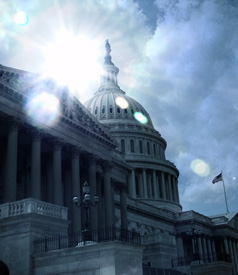Washington – Senate approval of the U.S.-Russia nuclear arms treaty was assured Tuesday as enough Republicans joined Democrats in a test vote to put President Barack Obama on the brink of a major foreign policy triumph.
The Senate voted 67-28 to cut off debate on the pact, a majority strong enough to ensure that the New START treaty will get the two-thirds majority it needs for approval from the 100-member Senate. A final vote is expected Wednesday.
Eleven Republicans joined 54 Democrats and two independents to form the majority vote. Three Republicans and two Democrats didn’t vote: Sens. Kit Bond, R-Mo., Sam Brownback, R-Kan., Judd Gregg, R-N.H., Evan Bayh, D-Ind., and Ron Wyden, D-Ore., who’s undergoing treatment for cancer and not expected to make the final vote.
Obama and his national security team personally lobbied lawmakers right up to the vote. Among those getting lots of attention was Sen. Lisa Murkowski, R-Alaska.
She described the president’s one-on-one approach as relatively “benign.” He asked her during a brief phone call to consider the issue on its merits, Murkowski said. She described information she got from military leaders as more persuasive.
Murkowski also spoke to Secretary of State Hillary Clinton and Vice President Joe Biden to assuage her concerns. She acknowledged she was looking at the treaty from a more “parochial lens” as Alaska’s senator, particularly its potential impact on the missile defense program at Alaska’s Fort Greely.
Murkowski voted to cut off debate. She was joined by a string of Republicans who came to the Senate floor one by one to announce that they’d go along despite the stout opposition of the GOP’s top two Senate leaders.
Sen. Lamar Alexander, R-Tenn., the Senate’s third-ranking Republican, voted with the majority, saying he did so because the treaty “leaves our country with enough nuclear warheads to blow any attacker to kingdom come, and because the president has committed to an $85 billion 10-year plan to make sure that those weapons work.”
Sen. Bob Corker, R-Tenn., also joined the supporters
“I firmly believe that signing this treaty, that ratifying this treaty, and all the things we’ve done over the course of time as a result of this treaty, is in our country’s national interest,” he said.
Sen. George Voinovich, R-Ohio, offered a bipartisan plea.
“Support for the treaty should not be viewed through the lens of being liberal or conservative, Republican or Democrat,” he said, “but rather what is in the best interests of our national security, the best interests of the United States of America.”
Other Republicans, though, contended that the treaty would hamstring American efforts to develop a missile defense system that would sufficiently protect the United States and its allies. Defense Secretary Robert Gates and other military officials dispute that. Five secretaries of state for former Republican presidents have endorsed the treaty.
Republican opponents also argued that the treaty makes it too easy for Russia to cheat, but its defenders said one of its primary virtues is that it restores inspection of Russian arsenals after a year-long suspension that has worried U.S. intelligence officials.
The new inspection system would be more intrusive than the regime that ended last year. Among other measures, U.S. and Russian experts will be allowed for the first time to look inside the other’s missiles and count the number of warheads they carry.
The treaty would limit the U.S. and Russia to deploying no more than 1,550 strategic nuclear warheads on 700 strategic bombers, intercontinental ballistic missiles and submarine-launched missiles by the end of seven years.
The new limit represents about a 30 percent drop from the limit of 2,200 set in a 2002 treaty that will expire at the end of 2012.
Obama sent letters to four senators – Alexander and Sen. Thad Cochran, R-Miss., and Democrats Dianne Feinstein of California and Daniel Inouye of Hawaii – reaffirming his commitment to keeping the U.S.’s nuclear weapons complex modernized.
He noted that he requested a 10 percent increase in the budget for weapons activities at the National Nuclear Security Administration.
“I recognize that nuclear modernization requires investment for the long-term, in addition to this one-year budget increase,” Obama wrote. “That is my commitment to the Congress – my administration will pursue these programs and capabilities for as long as I am president.”
Obama also stressed in the letters that Russia is working with the U.S. to respond to international concerns about North Korea, underscoring the value of keeping the U.S.-Russian relationship on good terms.
“Because of important cooperation like this, I continue to hope that the Senate will approve the New START Treaty before the 111th Congress ends,” the president wrote.
Join us in defending the truth before it’s too late
The future of independent journalism is uncertain, and the consequences of losing it are too grave to ignore. To ensure Truthout remains safe, strong, and free, we need to raise $50,000 in the next 9 days. Every dollar raised goes directly toward the costs of producing news you can trust.
Please give what you can — because by supporting us with a tax-deductible donation, you’re not just preserving a source of news, you’re helping to safeguard what’s left of our democracy.
